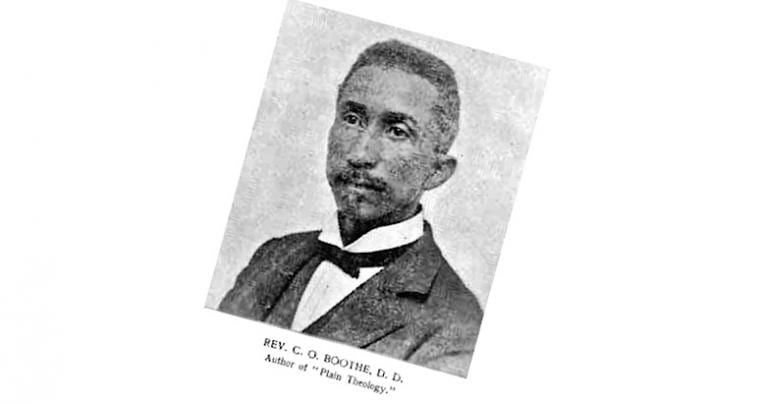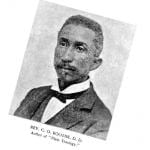 We are as we are, but thinking shows we are not as we should be. We fall short in our actions and we are broken. We cannot always do what we wish. The good, beauty, and truth exist and when we are bad, ugly, and false, paradise cannot receive us.
We are as we are, but thinking shows we are not as we should be. We fall short in our actions and we are broken. We cannot always do what we wish. The good, beauty, and truth exist and when we are bad, ugly, and false, paradise cannot receive us.
That’s the bad news with the good news that God provided a way to help us at the deepest level: we can be born again. We also can (though too often we do not) begin the slow climb to doing better. We can begin to be good.
What’s next? When we are saved from our brokenness and given hope of glory, then what? The Reverend Dr. C.O. Boothe shows us what’s next. We live out our life with “gifts flowing from the grace of God.” These are election, regeneration, repentance, faith, justification, sanctification, preservation of the saints.
The first gift Boothe mentions is election as children of God. Based on a series of Biblical passages he writes:
We see the purpose of God dating far back before the foundation of this world, before there had yet risen on it the sun and the moon by whose aid our days and months and years are measured. They tell us of God’s purpose, choice, election, and predestination long before the creation of any one of those who were thus to be brought to the kingdom prepared for them from the foundation of the world. If we ask why they were chosen and others were left, we find that no answer to the question has been given by him who alone can explain his reasons.
First, whatever the merits of his claim, Boothe is forcing his “plain” reader to consider a hard doctrine: election. Why? He has come to the conclusion that the doctrine is true and vital. He does not hesitate, because he assumes the plain people want the whole truth. This is very good.
Second, Boothe on this doctrine falls short of his normal apologetic method. The objection to the interpretation is obvious, but Boothe is not himself. He is not just unpersuasive, he retreats to piety:
It becomes us, then, to rest content with what it has seemed good to him to reveal. We, with all the light that has been thrown on the character of God in these days, when the true light shineth, ought certainly to feel as did Abraham when he said: “Shall not the Judge of all the earth do right?” Let us therefore bow reverently before him, saying: “Even so, Father, for so it seemed good in thy sight.”
Some ideas are hard, such as evil in the world, and we consider them best we can, but this is different. Here one feels Boothe has inherited a theological interpretation not true to the rest of his writing (some are elect and some are not), affirms it, but does not bother to defend it. This entire chapter is marred by this special pleading. Yet this also shows Boothe, for good and bad, in the mainstream of Evangelical understandings of atonement.
There should be no history of Evangelicalism without Boothe.
Faith is a term that has so many uses that it is useless when not defined. The central gift of God is faith* and Boothe defines faith as a process that includes a proclaiming of the truth, hearing the truth, believing the truth, and calling out to God based on the truth:
What, then, is meant by faith in the Lord Jesus Christ? It is a belief of all that God has taught and caused to be proclaimed to men concerning the Saviour and the salvation that his love has provided; and an earnest, honest calling on the Lord. That earnest and honest calling on the Lord means that all dependence on any thing else than what Christ Jesus has done is utterly renounced, and that in Christ is all his desire, all his trust, all his hope. In confession of his sin, the sinner sets to his seal that what God has said of his guilt and his lost condition is true. In his exercise of faith in Jesus Christ, he in like manner sets to his seal that all which God has promised—a full and final salvation from the guilt, the defilement, and the power of sin—is fully, unalterably true.
This is “faith” as a gift from God. Our faith reaches out to God, but God then gives us more. We plod forward by faith (reasonable trust) and look Godward and then God gives us a faith that is deeper. Our faith meets Faith. Our trust meets the virtue and so we are saved. Saving faith begins in reasonable trust and ends in knowledge: a gift of God.
Boothe sees all as Jesus Christ:
What a ground the Father hath given us for the fullest belief in Christ! What reason for devout thankfulness the redeemed have! What a motive to induce them to live, not unto themselves, but unto him who has brought to them a salvation so helpful and so glorious!
Dr. Boothe is thoroughly Reformed and if this an error, then it is an error that he consistently applies to all of his understanding of Scripture.
*Faith can also be used epistemologically where it is something like reasonable trust.
Boothe, Charles Octavius. Plain Theology for Plain People (Lexham Classics) . Lexham Press. Kindle Edition.












